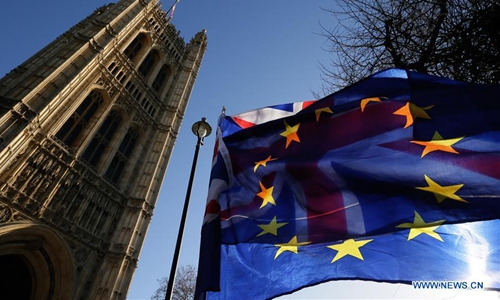HOME >> OPINION
How Europe faces global challenges in 2020
By Christian Tuschhoff Source:Global Times Published: 2020/1/14 16:33:40

File photo: Xinhua
Europe and the European Union (EU) more specifically face several important challenges in conducting international relations.
First, the US under President Donald Trump no longer underwrites the international liberal order. Instead it pursues a so-called transactional approach. It no longer relies on durable, long-term, and mutually beneficial partnerships but individual transactions only. Each transaction must meet the threshold of a positive cost-benefit calculation for the US.
This approach not only ended 80 years of American international hegemony but also pushes Europe toward a long-term process of building-up capacities in order to pursue Europe's international interest more independently.
Second, a more power conscious Russia under President Vladimir Putin brings new challenges to its neighboring EU member states in terms of Europe-Russia relations. Putin's vision of a Eurasian area under Russian leadership is incompatible with the EU's system of government based upon democracy, the rule of law, a free market economy, and human rights protection.
The Ukraine crisis effectively ended the EU's attempt to modernize Russia according to its Western model. Since then the EU needs to balance the security interests of its eastern member states on the one hand with the need to return to a working relationship with Russia based upon mutual détente.
Third, Europe is mainly an economic power pursuing global relations of stable partnerships conducive to mutually beneficial economic growth and welfare gains. Recently, the EU became concerned about China's augmented international influence based on its success in international economics. The EU progressively perceives China as an increasingly powerful economic competitor. Therefore, it seeks to negotiate the terms of the competition with China while realizing that the two systems of governance may not be fully compatible.
Thus, the new relationship with China will be a combination between bridging these differences through new rules of reciprocity governing the competition and a selective reduction of mutual access to markets in areas where penetration threatens to erode the foundational principles of the respective governance models.
The main asset of the EU is being an attractive market of 500 million consumers with extraordinary purchasing power. Moreover, it consists of member states with highly industrialized economies. However, the EU essentially coordinates member states through common rules-making rather than by governing through distributive policies. The strength of the EU's rule books is balanced by the weakness of its tools and capacities. Therefore, the EU must seek to better coordinate member states' military, economic, and political capabilities to increase the effectiveness of its own external actions.
The new European Commission under President Ursula von der Leyen indicated that it plans to engage in more effective geopolitical action by increasing its international profile. This plan needs to be supported by the pursuit of a wide range of projects leading to member states' capacity improvements.
For example, in military terms the EU coordinates some 50 member states' projects aiming at increasing the capabilities of national armed services and their combined operational capacities. In terms of currency, the EU reforms the institutions that underwrite the euro in order to be better prepared should an international financial crisis hit again. In economic terms, the EU works on improving the competitiveness of its industries on the one hand, and an improved infrastructure that removes the remaining obstacles of access within its internal market on the other. Politically, it prioritizes improved convergence around its governing model over adding new member states that first need to be socialized into the EU's complex body of laws.
Recent international developments laid open the essential weaknesses of the EU as an international actor. Having learned this lesson, the EU seeks to reduce these weaknesses by focusing on improving the resources underlying effective external action. The plans and projects share the need to improve preventive capabilities because the EU's strength is not crisis management but coordinated early diffusion of pending international conflicts.
In addition, the EU seeks to decrease its dependence from the US even though it is far away from becoming fully autonomous. For example and despite the reforms of underlying institutions, the euro is in no position to challenge the US dollar as the leading international currency for the foreseeable future. Therefore, the EU cannot afford to antagonize the US.
In case of a disagreement, the EU either does not comment on US policies or proposes alternatives to the US solution to international conflicts. For the time being, the success of the EU's external action requires multilateral cooperation. Persuading other parties of a conflict into agreement through diplomatic channels still remains the best available option.
As the EU must rely on building an internal consensus among member states, its action is more effective when it employs economic rather than political or even military power. The danger of internal division always looms large over the EU's external assertiveness.
The exit of the UK from EU membership indicates that managing the internal consensus is an indispensable precondition to effective external action. This requirement puts a premium on cooperation, prevention, and diplomacy, rather than crisis management, the use of sanctions or employment of military forces.
In light of these strengths and weaknesses of the EU, one can expect it to further engage in capacity building and forms of cooperative international conflict resolution in 2020. EU success will be an incremental story rather than a showtime event.
The author is an adjunct professor of political science at the Free University Berlin, Germany. opinion@globaltimes.com.cn
Posted in: VIEWPOINT